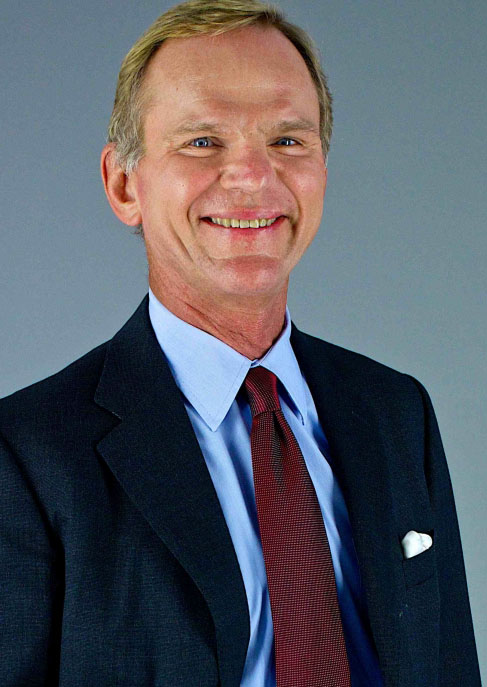 Dr. Juris Ulmanis, PhD, is the co-founder of Experiential Simulations, a company that develops simulations and gamification software programs to help students learn and professors teach "by doing". His prior experience includes various leadership and management positions at Motorola Inc., in the United States and Europe, where he spent 18 years. Juris is also a Vice-Chairman of the European Scout Foundation in Geneva, Switzerland, and a Vice-President of the Latvian Swimming Federation. During the last 2 decades Juris has been teaching entrepreneurship, marketing and international business studies in various universities across Europe. He is also a sought-after speaker and media commentator, and regularly trains, consults, and mentors individuals and regional businesses in entrepreneurship, marketing, sales, trust-building, negotiations, leadership, adventure and mountaineering.
Dr. Juris Ulmanis, PhD, is the co-founder of Experiential Simulations, a company that develops simulations and gamification software programs to help students learn and professors teach "by doing". His prior experience includes various leadership and management positions at Motorola Inc., in the United States and Europe, where he spent 18 years. Juris is also a Vice-Chairman of the European Scout Foundation in Geneva, Switzerland, and a Vice-President of the Latvian Swimming Federation. During the last 2 decades Juris has been teaching entrepreneurship, marketing and international business studies in various universities across Europe. He is also a sought-after speaker and media commentator, and regularly trains, consults, and mentors individuals and regional businesses in entrepreneurship, marketing, sales, trust-building, negotiations, leadership, adventure and mountaineering.
Magazine MN: Juris, being a senior manager at Motorola Inc. for nearly 18 years and having started 2 companies, what are the 3 greatest business lessons you’ve learnt so far?
Juris: Hard work and a bias for action create results. Motorola was a results-oriented company. To be an entrepreneur one must also be very results-oriented. I like getting things done and I like doing things that others do not want to do or would be deemed as not possible. I think that this is reflected in my choice to come to work in Eastern Europe when the Berlin Wall came down. My favorite activities are the ones that allow me to see immediate results, e.g. washing the dishes or mowing the lawn.
Being curious and always willing to learn. When I began my career, I knew very little about telecommunications and technology. Since I worked for one of the biggest technology companies in the world, I had to learn about both to be successful. Also, one needs to go from being a specialist to a generalist. At Motorola my main responsibility was sales/marketing, but as an entrepreneur, I need to be responsible for many functional areas: sales, marketing, production, finances, accounting, logistics, customer service, HR, etc. All of these have to be learned, and one needs to be curious to learn. One of my favorite books as a child was "Curious George" - the troublesome monkey character that loves to learn new things and get himself into trouble. Curiosity can lead to trouble, but more often it can lead to new ideas and new adventures. That is what entrepreneurship is all about.
Flexibilty and adapting to change. Personal and professional growth requires change. Change is hard. Whether it is living and working in different countries, changing roles (as corporate "suit"/entrepreneur/professor), meeting the challenges of work and daily life, climbing mountains, being in the Arctic. Change requires a certain amount of maturity, courage and epiphany. As Henry Ford once said, “If you always do what you’ve always done, you’ll always get what you’ve always got.”
Magazine MN: How would you define your leadership style? What, in your opinion, makes a great leader?
Juris: I have grown to become a Theory Y leader. I believe that people are an asset, an asset to be valued and developed – to collaborate with to create value. I think there are three things that make a great leader: 1) understanding others (empathy); 2) creating an environment where others can succeed; 3) do it in a way that it’s ‘right’ (honesty and integrity).
Magazine MN: Apart from being an entrepreneur and teaching business studies to students all over Europe, you’re also a Vice-Chairman of the European Scout Foundation, theater producer and polar explorer/mountain climber. How do you manage to be involved in numerous activities and stay productive?
Juris: Firstly, all of the activities that I am involved in are connected in one way or another, they take the form of serving people (especially young people) and have a certain element of adventure. These activities complement and build one upon the other. Of course, sometimes I do feel that I am not keeping up, but I try to focus on the things that I feel will have the biggest impact at the moment. Focus is very important. For example, now I have a new role as the Vice President of the Latvian Swimming Federation, whereby I see as a priority to work on solving the problem of high drowning rates in Latvia as well as to organize and prepare a national swim team for the 2016 Summer Olympic Games in Rio De Janeiro.
In all of my projects, I have wonderful people around me that share my passions, values and beliefs, and that much is achieved through collaboration. I do spend a lot of time in planning and reflective mode – what is important, what I can do better, what is the end goal that I want to achieve. I meditate every day. I write down things – lists, priorities - and even have a diary where every day I write down three good things that happened during the day.
Magazine MN: Mountain climbing is a risky activity. In your opinion, what can mountain climbing teach us about running a business and taking risks?
Juris: Firstly, mountain climbers do not take risks, at least I don’t. That is a recipe for disaster. As my experience has shown and I was taught by my veteran Latvian mountain climbing partners, the main idea is to mitigate risk. This means preparation, planning, teamwork, practice, pace, prioritization, reflection – all is done to make sure that risks are minimized. And in the mountains something can always happen which you did not think of or could not control, and it probably will – but, at least, all the basics were taken care of. The same goes for being an entrepreneur. As a matter of fact, the classic Harvard definition of entrepreneurship coined by Professor Howard Stevenson, for whom I had the honor of being a student is: ‘Entrepreneurship is the pursuit of opportunity without regard to resources currently controlled.’ I could easily substitute the word "mountain climbing" for "entrepreneurship".
Magazine MN: What was the most memorable moment in your career/entrepreneurial journey?
Juris: The most memorable or catalyst moments have been those associated with crisis. For example, nearing a mountain summit and debating whether to turn back because of oncoming bad weather or losing a tent in a snowstorm, also such things as losing an important customer(s), family issues, death of a loved one, or any other jolt. All these things have caused internal personal battles which have been like tests – tests of faith, hope and love. These moments have made me look at myself, self-assess, as to what is really important in my life, and have led to personal transformation.
Magazine MN: Tell us more about Experiential Simulations. How did it get started and what is its main mission?
Juris: The company Experiential Simulations was launched in Canada about two and a half years ago by Dr. James Bowen, his three grown up children and a son-in-law, and myself as a response to the unprecedented changes, and hence emerging opportunities in education and in student demands. James and I, both of us being professors, experienced this first-hand on a day-to-day basis.
Today’s young people are the interactive generation, and their approach to learning is more technology-driven and experiential by nature. We felt that, in addition to standard lectures, homework assignments, internships, in-class exercises, cases, experiential learning needs to take place along with learning in a virtual environment, whether it is done individually or through collaboration with others online. Experiential Simulations develops computer simulations, "serious games", so to say, with a mission to make learning engaging, fun, and experiential. We are here to change the way the world learns.

Magazine MN: How does the concept behind Experiential Simulations work?
Juris: We, the company Experiential Simulations, currently have an entrepreneurship simulation called "Traction" in the market, with ethics (called Ethos), information technology (called Agile), and project management (called Milestone) simulations to be launched very soon. The concept behind each simulation is that they challenge students to analyze available information and let them make critical decisions to solve a challenge.
Simulations allow students to experiment with ideas and outcomes and ultimately master the application of concepts to real situations. For example, Traction, the entrepreneurship simulation, allows students to experiment with startup strategies, ideas, and outcomes that change based on student inputs or decisions over time. Students make multiple sequential decisions, each decision impacting the next one. This allows for a true entrepreneurship experience and enables to apply key entrepreneurship concepts into real-life business situations. I employ it in two ways: as a complement to our regular casework with each of the 18 rounds assigned weekly to reflect the topic at hand; or by organizing a Traction tournament at the end of a course either as an exam or for fun.
Magazine MN: In your opinion, how does the application of simulations and gamification benefit students ?
Juris: Children learn by playing games, and for some reason we stop playing most games after elementary school. Having an experience as opposed to reading about an experience is a better way to learn. Simulations allow students to integrate and apply material that they have learned. It gives them the opportunity to test a hypothesis and receive immediate feedback, while at the same time getting tremendous amounts of learning, even when the results are different in various runs of the simulation. Students enjoy competing and winning. A good simulation includes a strong competitive element that encourages students to ‘think out of the box’ so as to impress their peers, and even faculty. The retention, energy, fun, engagement that a good simulation provides is very exhilarating.

Magazine MN: How was the idea of creating Experiential Simulations born?
Juris: After years of observation, consumed with frustration in attempting to teach entrepreneurship to students, James and I felt that there has to be a better way. James is a very creative/technical person and he came up with an idea and developed the Traction entrepreneurship simulation. As we are both entrepreneurs, with similar interests and backgrounds, each of us living on the other side of the Atlantic, we felt that together we could cover pretty much the whole world.
Magazine MN: What’s your best piece of advice for the first-time entrepreneur?
Juris: The three rules of mountaineering are: "It’s always further than it looks. It’s always taller than it looks. And it’s always harder than it looks.’’ Paraphrasing it into entrepreneurship advice, I would say - focus on how the end-user customers perceive the impact of your product/service rather than on how you, the entrepreneur, perceive it. Being an entrepreneur is really hard, and one must be prepared to be in it for the long-term, therefore it is important to take baby-steps, be prepared to make mistakes, and to learn from them, have consistent excellent execution, and surround yourself with great, loyal people.
Experiential Simulations website http://www.experientialsimulations.com/
Get in touch with Juris on
twitter https://twitter.com/jurisu
linkedin https://lv.linkedin.com/in/jurisulmanis
Juris Ulmanis was interviewed by Natalie Myhalnytska
